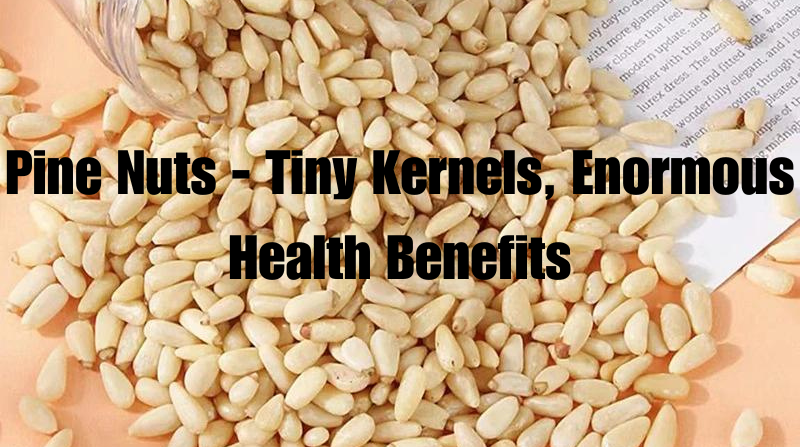
Pine Nuts – Tiny Kernels, Enormous Health Benefits
Benefits of Pine Nuts
Introduction to Pine Nuts
Derived from the cones of pine trees, pine nuts exhibit a small size, cream-colored appearance, and offer a buttery texture with a delicate, nutty flavor. These seeds have been a culinary delight for centuries, finding their origins in the Mediterranean, particularly in Italy. The benefits of Pine Nuts are remarkable.
Pine nuts hold immense culinary significance across various cuisines globally. Their rich, nutty taste and versatility make them a prized ingredient in both sweet and Savoury dishes. Due to their healthy fat content, they’re an excellent source of energy.
Additionally, they contain essential nutrients like magnesium, vitamin E, and antioxidants, contributing to heart health and overall well-being. Incorporating pine nuts and groundnuts into your diet can enhance satiety and promote healthy cholesterol levels. With their unique flavour profile and numerous health benefits, pine nuts stand as a valuable addition to any culinary repertoire.
Nutritional Benefits of Pine Nuts
Pine nuts are a nutritional powerhouse, offering a wide array of essential nutrients. In terms of macronutrients, they are a rich source of healthy fats, primarily monounsaturated and polyunsaturated fats, which are beneficial for heart health. They also provide a moderate amount of protein, aiding in muscle repair and growth.
As for micronutrients, pine nuts are abundant in magnesium, a mineral crucial for various bodily functions, including muscle function and bone health. Similarly, cashew nuts are rich in magnesium, supporting similar functions.
Vitamin E, an antioxidant that aids in protecting cells from damage, is also abundant in them. The benefits of Pine Nuts extend beyond their nutrient content, contributing to overall well-being.
Due to their high healthy fat content, they promote satiety and can be a valuable addition to a balanced diet. Furthermore, the presence of magnesium aids in regulating blood pressure and supporting a healthy immune system. In essence, incorporating pine nuts into your meals not only enhances flavour but also contributes to overall well-being.
Culinary Benefits of Pine Nuts
Pine nuts have held a cherished place in culinary traditions for centuries, imparting a distinct nutty richness to a variety of dishes. In traditional cuisines, particularly in Mediterranean regions, they feature prominently. In crafting the iconic Italian pesto, individuals grind pine nuts with basil, garlic, Parmesan cheese, and olive oil to create a flavorsome sauce for pasta or a versatile spread.
Additionally, they’re a crucial ingredient in Middle Eastern and North African cuisines, often found in dishes like kibbeh and baklava, adding a delightful crunch and flavour. In modern gastronomy, chefs have taken pine nuts to new heights, incorporating them into an array of creative recipes.
From salads to desserts, their versatility shines. They can be toasted and sprinkled over salads, including pista, for a delightful crunch or blended into creamy dressings. In desserts, they add a buttery texture and nutty taste, elevating treats like tarts and cakes. Embracing both tradition and innovation, benefits of pine nuts continue to inspire culinary enthusiasts worldwide.
Health Benefits of Consuming Pine Nuts
Pine nuts stand out as a nutritional powerhouse, offering a range of health benefits. They play a significant role in promoting cardiovascular health. Packed with monounsaturated and polyunsaturated fats, they contribute to reducing bad cholesterol levels, safeguarding the heart against potential risks.
Additionally, the presence of magnesium aids in regulating blood pressure, ensuring a healthy cardiovascular system. Beyond this, pine nuts are a nutrient-rich superfood similar to almonds. Loaded with essential vitamins and minerals, they provide a concentrated source of energy and vitality.
Rich in antioxidants like vitamin E, they protect cells from damage caused by free radicals, bolstering the immune system and supporting overall well-being. Furthermore, their protein content aids in muscle repair and growth, making them a valuable addition to a balanced diet.
Incorporating the benefits of Pine Nuts into your meals not only enhances flavour but also contributes significantly to your health, particularly in terms of cardiovascular well-being and overall nutrient intake.
Cultural Significance and Pine Nuts
Pine nuts bear a remarkable cultural significance, their history interwoven with various societies. In ancient times, these small, cream-coloured seeds were a staple in the diets of indigenous cultures worldwide. Native American tribes, for instance, held them in high regard for their nutritional richness.
Beyond sustenance, pine nuts carry symbolism in many cultures. In Mediterranean societies, they symbolize fertility, often featured in wedding ceremonies as a token of prosperity and well-being. Middle Eastern cultures also embrace pine nuts, considering them a symbol of abundance and hospitality, featured prominently in traditional dishes.
Understanding the historical usage and symbolism of pine nuts provides a profound appreciation for their cultural relevance. They are not just a culinary ingredient; they are a thread woven into the fabric of human traditions and rituals, connecting generations through shared culinary heritage.
Sourcing and Storing Pine Nuts
Pine nuts are a prized ingredient, and understanding how they are sourced and stored is essential for making the most of their benefits. These delicate seeds are typically harvested from pine cones, a process that requires precision and care.
Once extracted, they undergo processing to remove the outer shell, revealing the cream-coloured kernels within. To ensure the highest quality, sourcing from reputable suppliers is crucial, as it guarantees freshness and purity.
To conclude
Proper storage is equally vital in preserving the flavour and nutritional value of pine nuts. Due to their high oil content, they are susceptible to rancidity if exposed to heat, light, or moisture. To maintain their freshness, it’s advisable to store them in airtight containers in a cool, dark place. Additionally, refrigeration can extend their shelf life.
By understanding the sourcing and storage of pine nuts, one can fully appreciate their culinary potential and harness their numerous benefits.